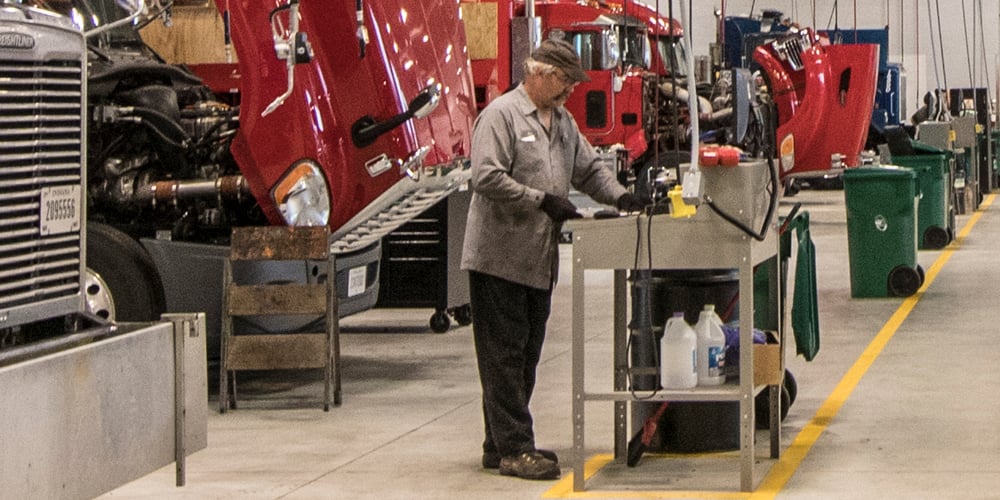If you’re looking to make a career out of being a diesel mechanic, there are some certifications you’re going to need — and others you’ll want to stand out amongst other job candidates.
The required certifications help ensure you’ll do the job properly based on national standards. Additional certifications prove you have the skills it takes to excel as a diesel mechanic.
Since 1955, Anderson Trucking Service (ATS) has been using diesel trucks to move freight down North America’s roadways. And since that time, we’ve needed quality technicians to keep those trucks operating optimally. So we know what it takes to be a great diesel mechanic.
In this article, we’ll break down which qualifications you need to be a diesel mechanic and which certifications you want to pursue to set yourself apart from your peers.
What Certifications Are Required for Diesel Mechanics?
To perform your duties as a diesel technician long-term, you’ll need:
- A Department of Transportation (DOT) certification
- A Class A or Class B driver’s license
Let's learn a little more about each of them in turn.
What is the DOT Certification?
The DOT certification is required for anyone performing inspections, investigations, or safety audits on commercial vehicles. Many states offer certification programs, but you’ll either want a U.S. certification or one from the state your company’s vehicles are licensed.
For example, ATS is headquartered in Minnesota, but our trucks are licensed out of Indiana. ATS technicians get the U.S. certification, not Minnesota’s.
To keep an up-to-date certification, you must be recertified every two years.
How to Get DOT Certified as a Mechanic
If you’re attending school to earn your diesel technician degree — or planning to — you’ll likely be given the opportunity to get your DOT certification before graduation.
That's contingent on what type of program you’re attending. If you’re going to a traditional two-year program, you’ll more likely than not be given the chance to be certified. However, if you’re attending a nine-month program, you probably won’t get that opportunity. That’s because you need at least one year of experience before you can try to earn your certification — and one year of schooling counts towards that.
So what can you do if you don’t have a year of experience from schooling? How can you get to the point where you can try for your DOT certification?
Many companies will hire you prior to earning your certification — and will likely help you get it.

What is a Class A or B Commercial Driver’s License (CDL)?
A Class A CDL allows someone to drive a vehicle that weighs 26,001 pounds or more along with a trailer that weighs 10,000 pounds or more. This is the CDL truck drivers have to earn.
A Class B CDL allows someone to drive a vehicle that weighs 26,001 pounds or more and a trailer weighing up to 10,000 pounds (a dry van trailer weighs roughly 33,000-36,000 pounds, for reference). Most commonly, you’d see Class B CDLs used to drive box/straight trucks, buses that haul passengers, and dump trucks.
How Can I Get a CDL?
To obtain a Class A or B CDL, you must be at least 21 years old to drive across state borders. If you’re just driving throughout the maintenance facility you work at — or throughout the state you live in — you can get your Class A as an 18-year-old.
The rest of the process is similar to getting your regular Class D license, with a written test, a learner's permit, and a road test. It’s a bit more intricate than that, of course, but you get the point. Oh, and you’ll be doing so with a much larger vehicle.
Do I Need a CDL to be a Diesel Mechanic?
You don't need a CDL to be a diesel mechanic, but it's highly recommended; some shops even require it.
While either license would allow you to drive the trucks you’re working on — as long as you don’t have a trailer attached — you’ll be better off career-wise if you get a Class A CDL. That way, you’re not limited if a trailer happens to be attached to a vehicle that needs to be moved — making you a more valuable employee.
The process for getting a Class A isn’t much different from a Class B either, so you might as well go for the A. It’ll also put you ahead of your peers that don’t have a Class A (or a commercial license at all before starting employment).

What Certifications Should I Get to be a Diesel Technician?
While you’ll be required to have an up-to-date DOT certification (and a CDL is highly recommended), the following certifications/training will help you stand out from your peers:
- Fleet Tire Service for OSHA Compliance
- Section 609 Technician Training and Certification
- Bendix Brake Training
- Hendrickson Brake Certification
- Truck-Lite Training
- Original Equipment Manufacturer (OEM) Engine Certifications:
- Detroit Diesel Engine
- Cummins Diesel Engine
- Volvo Diesel Engine
- Paccar Diesel Engine
Obviously, all of the above certifications and training won’t be required at every shop, but the more skills you have, the more versatile you’ll be.
What is the Fleet Tire Service for OSHA Compliance Training?
The fleet tire service training consists of a four-hour video/workbook program and can be conducted by an in-house instructor if the company you’re looking to work for has one. Following the lesson plans and quizzes, you must complete a 50-question final exam.

What are the Section 609 Technician Training and Certification (TT&C) Programs?
Anyone who repairs or services a motor vehicle air conditioning (MVAC) system must be trained and certified under section 609 of the Clear Air Act through a U.S. Environmental Protection Agency (EPA)-approved program.
What is Bendix Brake Training?
This online Bendix brake training course provides technical training using instructional videos and interactive modules on topics that include air dryers and compressors, disc and drum brakes, valves, and air brake systems.
What is the Hendrickson Brake Certification?
The air brake manufacturer offers online courses for a variety of their products. Once you successfully complete a course — including a brief test — you’ll receive a certificate that can be printed.
What is Truck-Lite Training?
The Truck-Lite Training Institute is a series of online courses that educate technicians and parts associates. Courses focus on product knowledge, technical expertise, diagnostics, and system solutions.
What OEM Engine Certifications Should I Get?
The types of OEM engine certifications you’ll want will depend on where you want to work. Working for an OEM dealer would, of course, only mean you’ll need certifications for the equipment at that dealer. For example, if you work at a dealer that only sells Paccar engines, that’s the only certification you’ll need.
Many carriers only use one make and model of tractor and pick their preferred engine model to pair with it, so you’d only need that particular engine manufacturer’s certification in that case too.
However, some carriers (like ATS) use multiple makes and models with multiple engine types, so you’ll want to be covered for all of the OEM engines you’ll encounter — including Detroit, Cummins, Volvo, and Paccar.
How Else Can I Stand Out as a Diesel Mechanic?
If you aren’t already in school — or weren’t planning on attending school — know it’s not vital to getting a career as a diesel technician. On-the-job experience can get you where you want to go in your career.
That said, a formal diesel technician education — between nine months and two years — will put you a step ahead of those who don’t have a formal education. You’ll learn a lot of the basic skills it takes to succeed as a mechanic. Even an automotive degree will put you ahead of those without a degree.
Beyond formal training and certifications, there are plenty of videos on the internet that can help you learn techniques for fixing and maintaining diesel engines. Spend some time on YouTube learning (although, you’re probably already doing that if you’re interested in diesel engines).
What Qualifications Do I Need to Become a Diesel Technician?
If you’re looking to make a career out of — and excel at — being a diesel mechanic, you’ll want to make sure you get DOT-certified. It's also recommended you get a CDL.
Being DOT-certified is required for anyone performing inspections, investigations, or safety audits on commercial vehicles. There’s no option whether or not to get that done. You’ll also have to renew it every two years.
You’ll need a Class A or B CDL to move the vehicles you’re working on, so that’s something you’re going to want so you can perform your job duties without assistance. A Class A CDL will allow you to drive the tractor and the trailer, so Class A is the way to go so you don’t have any exceptions.
If you want to stand out, make sure you have the following certifications/training:
- Fleet Tire Service for OSHA Compliance
- Section 609 Technician Training and Certification
- Bendix Brake Training
- Hendrickson Brake Certification
- Truck-Lite Training
- OEM Engine Certifications:
- Detroit Diesel Engine
- Cummins Diesel Engine
- Volvo Diesel Engine
- Paccar Diesel Engine
Depending on where you choose to take your career, you won’t necessarily need each of those certifications. Some maintenance facilities and carriers only use a select amount of OEM equipment, while others (like ATS) will use all of the items listed above.
Beyond those certifications, if you have a formal education as a diesel technician you’ll be in a better position than those who don’t. Even an automotive degree will be more helpful than no degree.
Get Certifications While Working at Your Dream Job
If looking at the list of required certifications overwhelms you, don’t freak out. First off, you don’t need to get all of them at once. Second, we’d be happy to help you get them — while you’re earning money as a diesel technician.
No matter where you are in your journey to become a diesel technician, we’d love to talk. ATS offers a variety of internship programs if you’re looking for hands-on experience while attending school. We also hire mechanics with a wide variety of experience.
Learn more or apply now.


